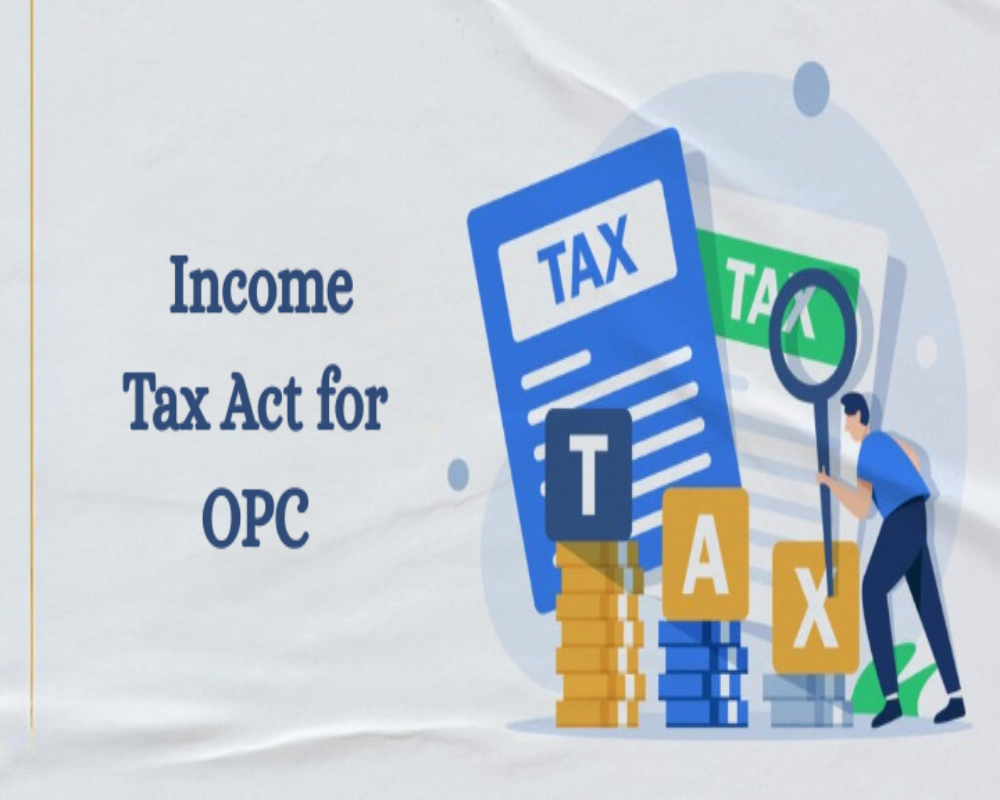Introduction
A One Person Company (OPC) is a unique corporate structure introduced under the Companies Act, 2013, that allows a single individual to run a business with limited liability and corporate status. Despite its simplified ownership and compliance requirements, an OPC is treated as a separate legal entity under the Income Tax Act, 1961. This means it is taxed like any other domestic company, irrespective of the fact that it has only one shareholder. Understanding how taxation works for an OPC under the Income Tax Act is essential for effective financial planning, compliance, and long-term growth.
Tax Status as a Domestic Company
Under the Income Tax Act, 1961, an OPC is classified as a domestic company, and it is taxed accordingly. It is not treated as an individual or a partnership firm, even though it may be owned and operated by a single person. As a domestic company, it is subject to corporate income tax at the applicable rates and must comply with the same tax provisions that apply to private limited companies.
Applicable Tax Rates
As of the current tax provisions, an OPC is subject to a base income tax rate of 22% under Section 115BAA of the Income Tax Act, provided it does not claim certain deductions and exemptions. Additionally, a surcharge of 10% and a health and education cess of 4% are applicable on the tax payable. This brings the effective tax rate to approximately 25.17%. If the OPC opts out of the concessional rate under Section 115BAA, the regular corporate tax rate of 25% (plus surcharge and cess) may apply, subject to turnover limits.
Taxable Income and Allowable Deductions
The taxable income of an OPC is computed by deducting allowable business expenses from its gross revenue. These expenses include salaries, rent, depreciation, marketing costs, interest on loans, and other business-related outflows. Deductions must be backed by proper documentation and must be incurred wholly and exclusively for business purposes to qualify under the Act.
Minimum Alternate Tax (MAT)
If an OPC claims various deductions or reports very low taxable income, the Minimum Alternate Tax (MAT) provision may apply. Under Section 115JB, MAT is levied at 15% of book profit, plus applicable surcharge and cess. This ensures that companies pay a minimum level of tax even when their taxable income is reduced due to exemptions.
Advance Tax Liability
An OPC is required to pay advance tax in four installments during the financial year if its total tax liability exceeds ₹10,000. The due dates for advance tax payments are June 15 (15%), September 15 (45%), December 15 (75%), and March 15 (100%). Failure to pay advance tax on time attracts interest under Sections 234B and 234C.
Filing of Income Tax Returns
An OPC must file its annual income tax return using Form ITR-6. The return must be filed electronically with a digital signature on or before October 31 of the assessment year, if the company is not subject to audit. If the company requires a tax audit, the due date is September 30. The return includes details of income, deductions, taxes paid, and financial statements.
Tax Audit Requirements
If the turnover of the OPC exceeds ₹1 crore (or ₹10 crore in case of digital transactions not exceeding 5% of total receipts and payments), it must undergo a tax audit under Section 44AB. The audit report, filed in Form 3CA/3CB and Form 3CD, must be submitted before the due date of filing the income tax return. This requirement ensures financial accuracy and transparency.
Dividend Taxation and Profit Distribution
Dividends distributed by an OPC are taxable in the hands of the shareholder, i.e., the sole member, as per the applicable slab rates. The OPC is not liable to pay Dividend Distribution Tax (DDT), which was abolished by the Finance Act, 2020. However, if the dividend paid exceeds ₹5,000 in a year, the OPC must deduct TDS (Tax Deducted at Source) at 10% under Section 194.
Conclusion
Taxation for a One Person Company under the Income Tax Act follows the structure applicable to private limited companies, ensuring legal clarity and consistency in the corporate tax framework. From paying corporate taxes at standard rates to complying with advance tax, audit, and return filing requirements, OPCs are required to maintain robust tax discipline. While they enjoy the benefits of limited liability and single ownership, they are also subject to the full spectrum of corporate tax obligations. Proper understanding and management of these tax provisions enable OPCs to operate legally, avoid penalties, and maintain financial health in the long term.
Hashtags
#IncomeTaxAct #OPC #TaxationExplained #TaxCompliance #BusinessTax #SinglePersonCompany #TaxDeductions #TaxFiling #FinancialLiteracy #SmallBusinessTax #TaxPlanning #Entrepreneurship #TaxObligations #TaxBenefits #IncomeTaxReturn #BusinessFinance #TaxEducation #OPCTaxation #SelfEmployed #TaxAdvice


0 Comments